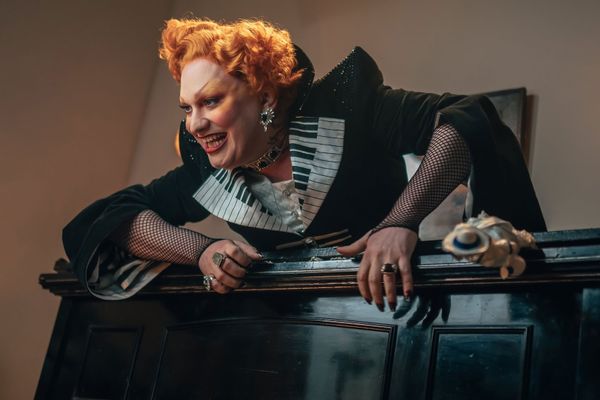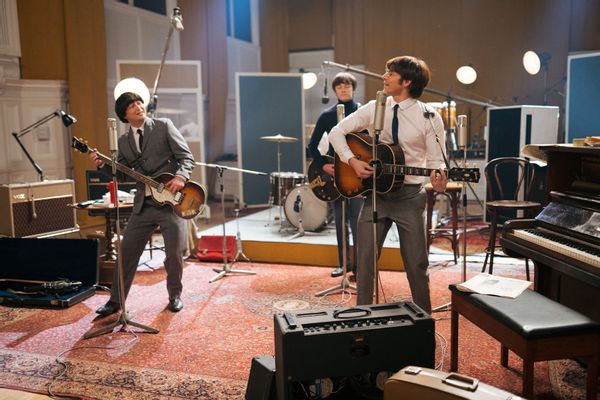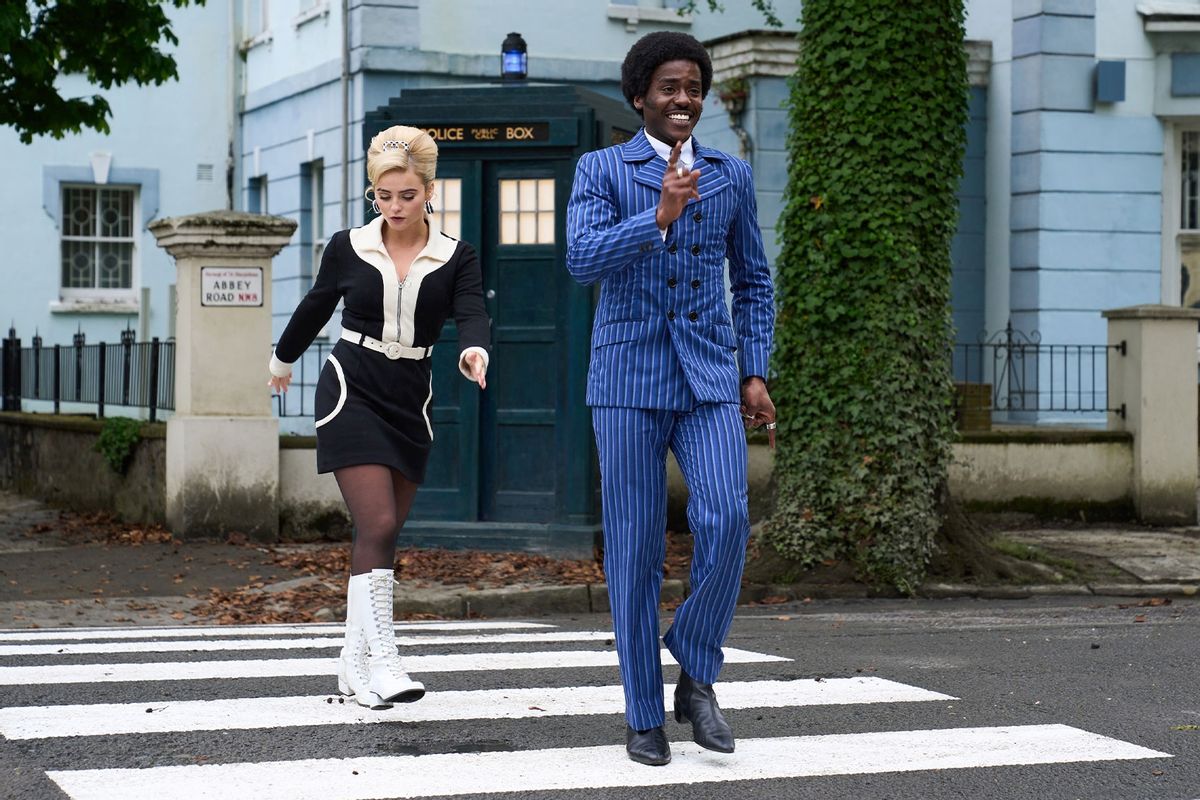Throughout its 60 years “Doctor Who” has been to the ends of the universe and back, to numerous versions of the distant past and far-flung futures. “The Devil’s Chord,” however, marks the first episode in hundreds that comes close to qualifying as a fully musical episode. By some people’s reckoning it is, and why argue?
There are multiple musical interludes, a battle with a god-like figure slicing into a violin set against the 15th Doctor (Ncuti Gatwa) and Ruby Sunday (Millie Gibson) on a piano, and a zesty closing song-and-dance number that would be perfectly at home on Broadway.
Characters may not belt out their dialogue, but The Doctor’s adversary Maestro (two-time “RuPaul’s Drag Race” winner and Broadway star Jinkx Monsoon) freestyles a piece of a ditty describing their daddy issues. The power of song and saving it are the main points “The Devil’s Chord,” which pits Fifteen and Ruby against Monsoon’s all-powerful being, described as the essence of music itself.
 Doctor Who (Bad Wolf/BBC Studios)
Doctor Who (Bad Wolf/BBC Studios)
A world without music is doomed, series creator Russell T. Davies posits in the episode he wrote – one that spells out the stakes by having The Doctor and Ruby swing by 1963 London to witness The Beatles record their first album.
What should be a memorable excursion throws them off when they watch Paul, John, George, and Ringo lay down a track at Abbey Road, and hear these lackluster lyrics:
“I’ve got a dog, he’s called Fred/ My dog is alive, he’s not dead/I love my dog, he loves me too/ I haven’t got a cat, only a dog . . .”
What follows is a game of cat and mouse wherein Maestro, the child of the Toymaker (played by Neil Patrick Harris in the 2023 special episode that introduced Gatwa) threatens to erase all sentient life for the sake of going solo. Quintessential “Doctor Who” . . . except for, you know, the musical part.
While the episode has been generally well-received since its May 10 debut, there are always some who take issue with a departure from, shall we say, the classic method of storytelling. Then again, the inevitability of change is written into the Time Lord’s DNA. Knowing that makes it strange to think that it’s taken this long to place its hero at the center of such a performance.
Even so, Gatwa and Gibson admitted in a recent interview that those scenes took them by surprise.
“Wasn’t in the audition process!” Gibson said with a laugh, moving Gatwa to add, “At all! Couldn't have expected that. Did not know that Russell had that in him.
“But it was a nice surprise,” Gatwa continued. “I mean, we got thrown in at the deep end.”
"This character has been switching things up for 60 years,” said Gatwa.
The star could be referring to any aspect of the episode, but he’s probably talking about the frantically euphoric episode closing sequence “There’s Always a Twist at the End.” The sequence challenges him and Gibson to sing and swivel furiously while backed by a corps of crisply choreographed dancers. Although The Doctor and Ruby show off their own footwork, neither Gibson nor Gatwa have dance training, which is surprising if you watch Gatwa move, whether to music or running from a threat. (Never forget: before he was The Doctor he was a Ken in “Barbie.”)
But in Gatwa's view, the musical adventures are aligned with this season’s overall objective. “Song and dance tend to be things that spring out of us when we're feeling joyful, and musicals are just, yeah, exactly what Russell said: joy,” he observed.
Musical episodes are a relatively recent undertaking in television, with one the earliest full-scale examples that comes to mind being “The Bitter Suite,” a 1998 episode of “Xena: Warrior Princess.”
The standard-setter is the 2001 episode “Once More with Feeling” from “Buffy the Vampire Slayer,” a beloved series whose fervent fanbase relived its songbook through local singalongs . . . until the series’ corporate parent, 20th Century Fox Television, shut them down.
We need your help to stay independent
Many series have indulged in musical episodes since those first aired, although sci-fi and fantasy series seem to be most open to such flights since characters are constantly encountering unexplained and novel phenomena. Even the second season episode of “Star Trek: Strange New Worlds” went full Broadway with its episode "Subspace Rhapsody."
“Doctor Who” would seem to be an exception mainly based on tradition, until one recalls how many episodes featured melodic elements in their plots. (Although with two of Gatwa’s first three episodes featuring its stars crooning and shaking a leg, this season may be the first to feature such numbers in close succession.)
 Doctor Who (Bad Wolf/BBC Studios)
Doctor Who (Bad Wolf/BBC Studios)
Several episodes throughout the show’s run use tunes as a device, dating back to William Hartnell’s Doctor and the third season serial titled “The Gunfighters.” The Time Lord’s companions were forced at gunpoint to perform “The Ballad of the Last Chance Saloon” while he was spared that indignity.
Much more recently Matt Smith’s Doctor joined a people’s choir in Season 7’s “The Rings of Akhaten,” where a civilization’s survival hinges on their performance of a song. This isn’t even the show’s first encounter with the Beatles – another Hartnell episode from the Season 2 serial “The Chase” contains the only remaining Beatles footage from “Top of the Pops,” since most of its recordings were wiped.
Want a daily wrap-up of all the news and commentary Salon has to offer? Subscribe to our morning newsletter, Crash Course.
None of Gatwa’s predecessors were called on to sing as confidently or move as dynamically as he does in the showstopper finale of “There’s Always a Twist at the End,” which is both exuberantly euphoric and, like most of the seemingly one-off bits in this series, invites closer reading as a clue.
It could be a simple in-joke since an actor named Susan Twist has made at least four appearances in the show since the 60thanniversary special “Wild Blue Yonder,” as the fansite Cultbox points out. Or . . . could it be hinting at something more sinister? Why can’t it be both?
Before the premiere of “The Devil’s Chord,” Gatwa and Gibson were aware that some fans might be put off by Davies’ musical direction. But they weren’t worried about it. "Complexity is one of the fruits of life, you know?” Gatwa said. “It's good to be challenged, it's good to do things differently.
"The show is about change, about progression, and about literally switching things up. This character has been switching things up for 60 years,” he added, “and it’s a really fun element to add to sci-fi. Just enjoy it!”
New episodes of "Doctor Who" stream Fridays on Disney+.



Shares